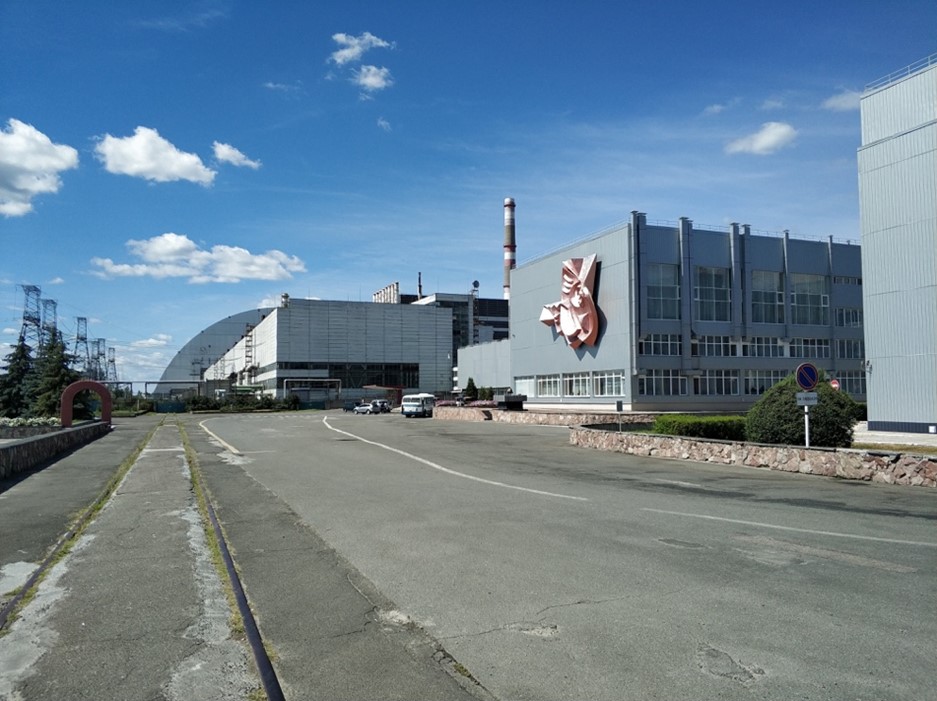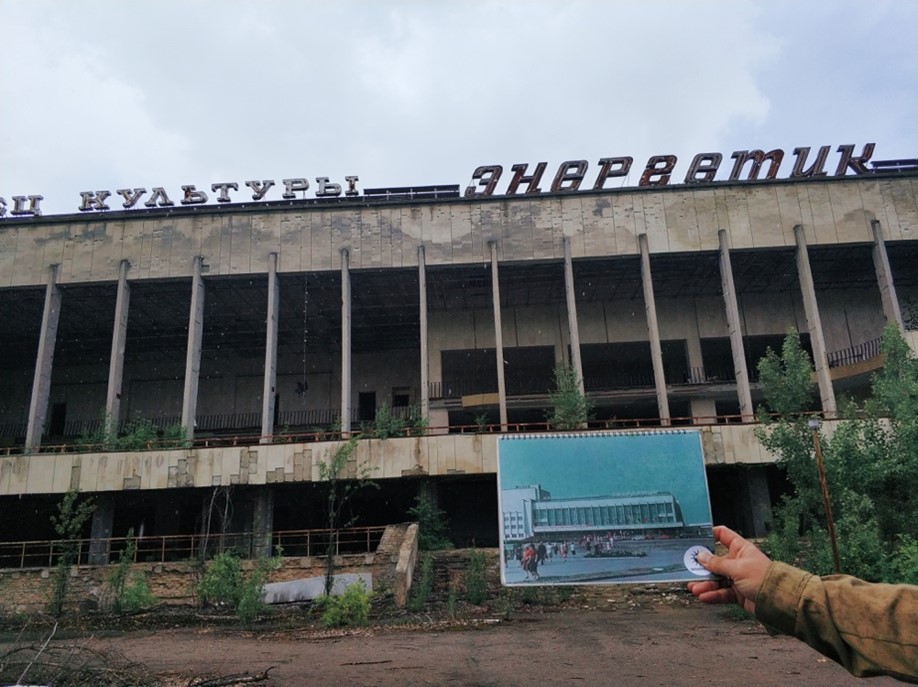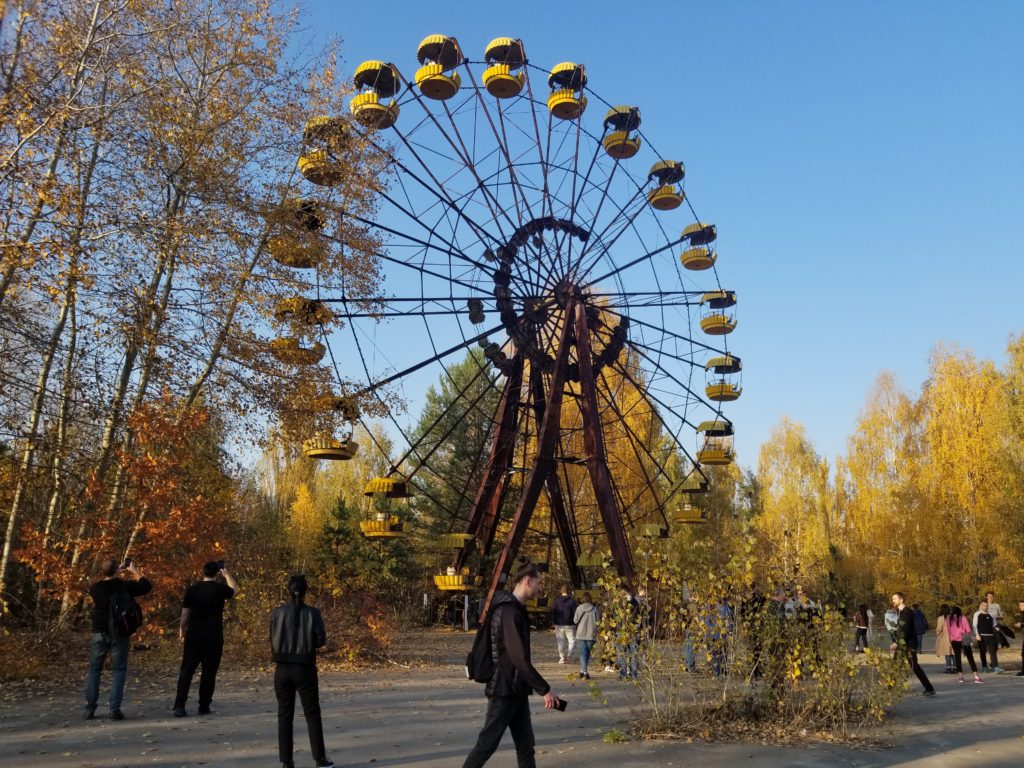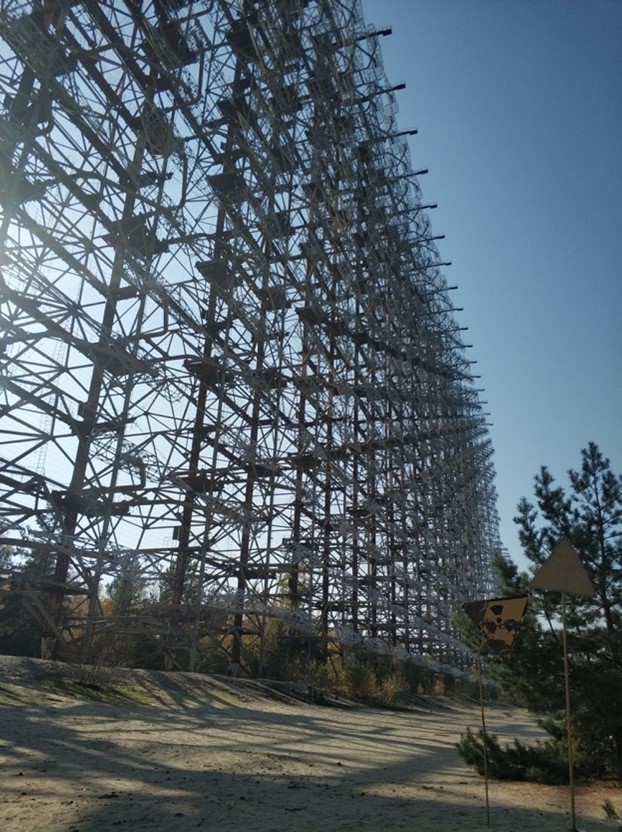April 30, 2021
Margarita Kalinina-Pohl and Julius Moye
This year marked the 35th anniversary of the Chernobyl nuclear disaster known as the worst nuclear accident in the history of mankind. Ukraine and international community held a series of high-level events to commemorate this solemn occasion, including a visit of the IAEA Director General Rafael Grossi to Kyiv, Chernobyl (Chornobyl in Ukrainian) Exclusion Zone, and WiN Ukraine (Ukrainian chapter of Women in Nuclear Global).

Chernobyl Nuclear Power Plant Today (Photo Credit: Anastasiia Nechytailo, CNS Fellow Spring 2020)
CNS commemorated this week of remembrance with an article publication in the Bulletin of Atomic Scientists and two webinars featuring Ukrainian experts, former and current CNS visiting fellows, and students.
In her article “It is not radioactive Disneyland: Visit Chernobyl but respect it” Margarita Kalinina-Pohl shared her personal experience of visiting the Chernobyl Exclusion Zone in 2018 and 2019 and reflected on its increasing popularity as a ‘dark tourism’ destination. She suggests treating the Chernobyl Exclusion Zone as an open-air museum to help preserve it for future generations and to educate visitors about its history and legacy.
Chernobyl at 35: From “Ground Zero” to a Nature Preserve
The first webinar “Chernobyl at 35: From “Ground Zero” to a Nature Preserve” was held on the day of the Chernobyl nuclear accident’s anniversary – April 26th – as a part of the CNS Visiting Fellows program series and was attended by the current cohort of fellows from Germany, Italy, Kenya, Nigeria, Pakistan, and Ukraine. The event’s speaker was Ms. Kateryna Pavlova, Head of the International Cooperation and Public Relations Department, State Agency of Ukraine on Exclusion Zone Management (SAUEZM). In her presentation (view slides), Kateryna focused on the present-day Chernobyl Exclusion Zone and its significance as critical infrastructure and as a nature reserve. She also shared her experience of leading efforts of fighting wildfires in the Exclusion Zone in her capacity as the SAUEZM Acting Head in April 2020. For more information about Kateryna’s experience of being the only women to ever lead the SAUEM, overseeing eight enterprises and 6,000 personnel, see her recent interview in the Bulletin of Atomic Scientists. CNS Vising Fellows Program alumni Nataliia Klos, a prominent nuclear security expert from Ukraine, provided additional commentary to Kateryna’s presentation and during the Q&A session.
Chernobyl Yesterday, Today, and Tomorrow
The second Chernobyl-based online event “Chernobyl Yesterday, Today, and Tomorrow” was organized by MIIS and Kyiv Polytechnic Institute (KPI) students Julius Moye and Yaroslav Viktorov with support from KPI Professor and current CNS visiting fellow Tymofii Bibik and CNS’s Margarita Kalinina-Pohl. The webinar opened with a presentation (view slides) by Yaroslav Viktorov, a graduate student of the KPI’s Master’s Program “Physical Protection, Accounting, and Control of Nuclear Materials.” The presentation by Yaroslav provided a wealth of information that documented the history of the Chernobyl disaster and many issues that Ukraine is still contending with today. Through the explanation of the isotopic properties of fallout and the effects on the surrounding region, Yaroslav somberly reminded the audience that Chernobyl’s impact is still widely felt across both geography and time.
“It is not just work. It is something that you connect with forever. This is part of your life.”
Kateryna Pavlova

Abandoned Palace of Culture in the town of Pripyat in the Chernobyl Exclusion Zone (Photo Credit: Anastasiia Nechytailo, CNS Fellow Spring 2020)
Following Yaroslav’s presentation, Kateryna Pavlova shared remarks and reflections on working in the Exclusion Zone and her duties in this role. As Kateryna poetically noted, “It is not just work. It is something that you connect with forever. This is part of your life.” This sentiment certainly rings true for the rest of the country that is connected with Chernobyl and its Exclusion Zone forever. Kateryna further informed participants about Ukraine’s radioactive waste management systems, the ecology in the Exclusion Zone, and the importance of international cooperation in fielding questions from an engaged audience.
Additional comments were offered by VCDNP’s Noah Mayhew (MIIS’17), KPI instructor and former CNS visiting fellow Hanna Martynenko, and Tymofii Bibik. Thoughts were provided on so-called “re-settlers” (the small number of residents who returned to their villages and are still in living in the Chernobyl Exclusion Zone) and how to properly handle visitations while still respecting the history of what happened in the area three and a half decades ago.

Crowds of tourists roaming around Prypyat’s iconic Ferris Wheel (Photo Credit: Margarita Kalinina-Pohl)
The webinar ended with a discussion between US and Ukrainian participants on their perspectives on Chernobyl and nuclear energy policy. The discussion produced a fascinating exploration of differences in the perception of Chernobyl across the generations. As one of the attendees noted, it was surprising just how much of a distant memory Chernobyl seems to the younger generations born after the 1980’s, even though it was only 35 years ago that this world-changing event unfolded. Indeed, there is certainly a need to ensure that Chernobyl’s lessons from yesterday are not forgotten tomorrow. Avenues such as the education system, visitations, and even social media will play a role in this.
Regardless of the medium, it is important that a solid understanding and sense of respect and gravity for Chernobyl is passed down through the years. Both KPI and CNS are proud to have played a role in these efforts.
Julius Moye is a third semester student at MIIS working on his MA International Trade & Economic Diplomacy and MA Nonproliferation & Terrorism Studies and a returned Peace Corps volunteer leader (Ukraine, 2016-2019)

Soviet-era missile defense early-warning radar “Duga” at the Chernobyl Exclusion Zone (Photo credit: Anastasiia Nechytailov, CNS Fellow Spring 2020)
